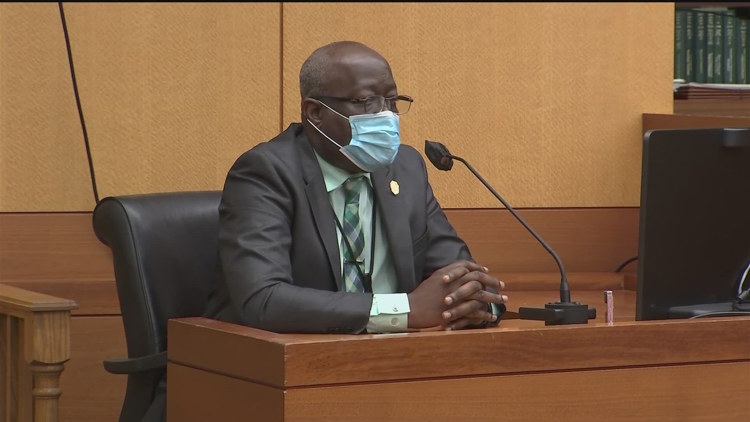Harris struggles to combat Trump’s anti-trans closing argument
Vice President Harris has struggled to combat former President Trump’s anti-transgender attacks, which are a major part of the former president’s closing argument. The Trump campaign has flooded the airwaves with advertisements that paint Harris as extreme for her past support for trans-inclusive policies, including a response recorded on an ACLU candidate questionnaire during her 2019 presidential...

Vice President Harris has struggled to combat former President Trump’s anti-transgender attacks, which are a major part of the former president’s closing argument.
The Trump campaign has flooded the airwaves with advertisements that paint Harris as extreme for her past support for trans-inclusive policies, including a response recorded on an ACLU candidate questionnaire during her 2019 presidential run that she would guarantee transgender people in prison and immigration detention have access to gender-affirming care.
The Supreme Court has held for nearly half a century that denying incarcerated people medically necessary health care is a violation of their constitutional rights, and federal prisons offered transition-related care, including surgery, under the Trump administration. The first person to receive gender-affirming surgery while in federal custody first sued for care in 2019, and a federal court granted her access in 2022.
The vice president has skirted explicit questions about transgender rights in recent interviews and has fallen short of offering a forceful rebuttal to the Trump campaign’s ads. On gender-affirming health care, Harris has said it is settled law that individuals should have access to medically necessary care, and treatment should be left to doctors and their patients.
“I’m not going to put myself in the position of a doctor,” Harris said this week in an interview with NBC’s Hallie Jackson.
Republicans see Harris’s responses as proof that the Trump campaign’s messaging is working, while some Democrats and LGBTQ advocates argue Harris’s caution on the topic is strategic.
“The Trump campaign understands that transgender care is not a top issue for voters – that’s not the point,” said one former Trump administration aide. “This is a stark reminder for the remaining undecided and low propensity voters in battleground states that Harris is no moderate.”
“Not only does this messaging fire up Trump’s base to maximize turnout on Election Day, it’s also a direct appeal to his main target in his closing arguments — young men — that a vote for Harris is a vote for a radical leftist agenda,” the source added.
Trying to define you
Transgender issues are among the least important issues driving voters to the ballot box, according to a recent Gallup poll, and Republicans’ similar focus on transgender athletes and health care in the 2022 midterms failed to render victories on election night. Most voters surveyed this month by the left-leaning polling firm Data for Progress said anti-trans ads aired this cycle are “mean-spirited” and have “gotten out of hand.”
NBC’s Jackson noted in her interview with Harris that Republicans are “trying to define you on this” issue and asked Harris for her message to LGBTQ Americans looking for a “full-throated backing” for the transgender community.
“I believe that all people should be treated with dignity and respect, period, and should not be vilified for who they are, and should not be bullied for who they are. And that is a true statement for me my entire career,” Harris said.
Asked if transgender Americans should have access to gender-affirming health care, Harris said, “I believe we should follow the law.”
Imara Jones, founder of TransLash Media, described Harris’s responses to Trump’s campaign ads as “contained” and “measured.”
“We know from modern campaigns that a key rule is that you don't allow attacks to go unanswered for any length of time, and I think what's interesting about this is that there hasn't really been a response that matches the level of the attacks,” she said. “These attacks are something that the Harris campaign has had months to prepare for, and the broader Biden campaign longer than that, because this was predictable to happen.”
Harris’s relative silence is reflective of a broader issue among Democrats in communicating their support for the trans community, she said.
At this year’s Republican National Convention in Milwaukee, for example, Republicans leaned heavily into anti-transgender rhetoric, while at the Democratic convention the following month, trans issues were mentioned by just two speakers, neither of whom is trans.
“There seems to be an overall reticence to match the scale of the attacks on the Democratic side,” Jones said.
That could be intentional, she added, and Harris, who has long supported LGBTQ rights, may be being deliberately vague in a bid to win over moderate Republicans and keep further Trump attacks at bay.
“It is a strategy to try to minimize the possible attack vectors that your opponent can make, and that the more specific policies you put out there, the more you're giving them an opportunity to pick them apart and to find the one sentence or the one bullet point that they can use to derive and undermine what you're trying to say and what you're trying to do,” Jones said. “That is a strategy — whether or not that's the right strategy, I don't know.”
Show some strength
Others, though, think that Harris needs to show more conviction on the issue while she has been criticized by some Democrats this week for relying too heavily on her stump speech in her recent interviews.
“If she truly believes in something like transgender rights, then say it. Show some damn strength already,” one Democratic political consultant said. “Voters respect candidates with guts. At the very least, they like candidates with guts who take a position, even if they disagree with you about the position.”
In an interview with Fox News’s Bret Baier last week, during which Fox played the Trump campaign ad referencing the 2019 ACLU questionnaire, Harris referred to a New York Times report that people in the federal prison system were offered gender-affirming care under the Trump administration.
“I will follow the law, and it’s a law that Donald Trump actually followed,” she said.
While Harris and her running mate, Minnesota Gov. Tim Walz, broadly support bodily autonomy, which includes gender-affirming care, that point is most often made in the context of reproductive rights.
Walz, the more vocal of the two on transgender rights, in a recent episode of the “We Can Do Hard Things” podcast said Trump’s closing arguments are intended “to demonize a group of people for being who they are.”
“They’re running millions of dollars of ads demonizing folks who are just trying to live their lives,” said Walz, who last year helped make Minnesota a refuge for gender-affirming care.
“Everybody wants to make sure that the presidential candidate is speaking to their issues,” said Sean Meloy, vice president of political programs at the LGBTQ+ Victory Fund. “Part of this is doing research; everything is not going to be handed out on a silver platter from a speech. We've got an amazing candidate when it comes to her record on LGBTQ rights.”
“The fact that Republicans are attacking her for that, is pretty telling,” he said.
Some Democratic strategists suggest that Harris stay focused on her own closing message, which is largely about arguing that Trump is a threat to democracy, rather than responding to attacks from her opponent.
“The closing arguments are transgender surgeries vs. Jan. 6; how each candidate responds to the message 12 days before the election is irrelevant. Could she do better? We can all do better, but so what? Focus on the finish line,” said Ivan Zapien, former Democratic National Committee official. “People aren’t consuming the whole attack or answer, it’s all shorthand and grunts.”
Meanwhile, The Trump team views the attacks on Harris as another way to paint her as too liberal in the final stretch.
“Harris would rather raise taxes to fund gender transition surgeries for illegal immigrants than extend the Trump tax cuts that put money back into the wallets of American families,” said Republican National Committee spokesperson Anna Kelly. “Kamala is for dangerously liberal spending, while President Trump is for you.”
What's Your Reaction?
























































